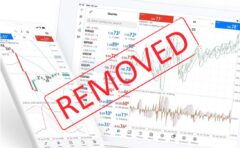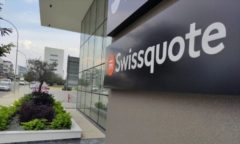Top FX/CFD industry news stories of 2022
2022 was a very different year from 2021.
In the “real world”, things quickly returned to normal after nearly two years of a COVID-induced work-from-home and travel-less environment. People came back to the office, folks packed airplanes and trains and subways (and restaurants and schools and shopping malls…).
In the financial world, two years (and more) of ultra-loose monetary policy led to an inevitable hangover of rising inflation and interest rates, a sluggish equity market, and fairly wild market volatility.
The Euro and Pound dropped to near-parity with the US Dollar (the EURUSD actually dropped to below 1.00 for a spell) before recovering somewhat toward year-end.
Cryptocurrencies crashed back down to earth, as did some of the leading crypto trading names and personalities – led by FTX’s fall from multi-billion dollar behemoth and ever-present sponsor logo to bankrupt sad story, culminating with the arrest of CEO Sam Bankman-Fried.
While these conditions may not be great for the average retail (or institutional) trader, it was very good and fertile soil for brokers which properly risk manage and live off of volatility-induced trading volumes.
But it was somewhat of a haves and have-nots type market out there, with some FX and CFD brokers setting activity records month after month, while others were clearly struggling and losing business to more aggressive and better prepared competitors.
Our Top FX/CFD industry news stories of 2022 are a combination of the most-read articles of the year here on FNG, themes which emerged during the year, as well as stories which are bound to help shape the sector as we move forward into 2023.
What were the most-read stories this year on FNG?
Which rising brand names in the FX/CFD business were somewhat humbled in 2022?
What were the key “deals of the year” and top management moves in the FX/CFDs sector?
Before we begin, we here at FNG would like to take this opportunity to wish all our readers happy holidays, and a healthy and prosperous 2023. We appreciate you all making us the most-read (and, by our competitors, most copied!) FX/CFD industry news site in 2022 as we broke virtually every news story in the sector that mattered – and we will continue to take that responsibility very seriously into 2023. Hope to meet you all in person as well as online in the new year!
1. MT4 and MT5 struggle – kicked out of the Apple App Store, while MetaQuotes halts new white labels.
 The one storyline which fits all the criteria we list above (most read, reshaping the industry..) is a story which we broke here at FNG – the removal of the MT4 and MT5 trading apps from the Apple App Store in late September. That was followed by developer MetaQuotes’ decision to halt the processing of all new MT4/MT5 white label requests, which was exclusively reported at the time by FNG. MT4 and MT5 account for more than half of all Retail FX/CFD trading, and the “new star formation” machine of the FX/CFDs brokerage industry has been startups beginning life with a white label MT4/MT5 set up by one of a number of tech and consulting firms.
The one storyline which fits all the criteria we list above (most read, reshaping the industry..) is a story which we broke here at FNG – the removal of the MT4 and MT5 trading apps from the Apple App Store in late September. That was followed by developer MetaQuotes’ decision to halt the processing of all new MT4/MT5 white label requests, which was exclusively reported at the time by FNG. MT4 and MT5 account for more than half of all Retail FX/CFD trading, and the “new star formation” machine of the FX/CFDs brokerage industry has been startups beginning life with a white label MT4/MT5 set up by one of a number of tech and consulting firms.
The continued absence of MT4 and MT5 from the App Store, and inability to start a new brokerage based on MT4 or MT5 (unless a pricy new license is acquired directly from MetaQuotes) has opened the door for other trading platform entrants, who are aggressively capitalizing on this opportunity.
How will things shake out in 2023? We’ll see, but it should be interesting.
2. eToro and Saxo Bank SPAC IPOs pulled.
 Two of the more visible brand names in Retail FX, eToro and Saxo Bank, took big hits in 2022 when the plans of each to go public by combining with a publicly traded special purpose acquisition company (or SPAC) were cancelled.
Two of the more visible brand names in Retail FX, eToro and Saxo Bank, took big hits in 2022 when the plans of each to go public by combining with a publicly traded special purpose acquisition company (or SPAC) were cancelled.
Each transaction was supposed to provide a (profitable) exit opportunity for the investors which had poured a lot of money into each broker. eToro’s plans to go public at a $10 billion valuation were scaled back to under $9 billion late last year, and then cancelled in mid 2022 when the company and SPAC partner FinTech Acquisition Corp V (headed by legendary financier Betsy Cohen) lost the support of outside private investors who were to put several hundred million dollars into the deal. Layoffs at eToro ensued.
Saxo Bank’s IPO plans for a $2 billion listing on the Euronext Amsterdam exchange had a much shorter tenure, announced in September and then cancelled in a quick about-face in December.
How will these failures affect these brokers in 2023? Or, other brokers’ ability to raise funds or exit? Stay tuned in 2023.
3. New CEOs and new direction for a number of FX/CFD brokers.

The “Executives News” section of our website was particularly active in 2022, as FNG reported on quite a large number of senior level management moves this past year, from the C-Suite on down.
And with a change in management oftentimes comes a change in strategy and direction. Cyprus based BDSwiss – despite its name and location – has basically abandoned Europe based business to focus on APAC and “other” markets. Capital.com hired IG Group’s former CEO with a clear mandate to build the brand into an industry leader, with a number of other ex-IG executives brought on board as the year progressed. LCG’s owners are looking to revive a once-proud name and have hired a new CEO and management team. The list goes on.
Some of the top Executive Moves in the FX and CFDs industry we reported on this year include:
- Former IG CEO Peter Hetherington replaces Jon Squires as CEO of Capital.com.
- BDSwiss appoints Nicolas Shamtanis as CEO.
- Luca Merolla replaces Phil Adler as CEO of Oval Money / OvalX.
- Eurotrader hires FX industry vet Marcelo Spina as CEO.
- Exclusive: LCG hires Dave Worsfold as CEO, adds other execs.
4. FX sector M&A and consolidation continues.
 While in 2022 there were no M&A deals in the FX/CFDs sector quite as large or noteworthy as 2021’s $250 million sale of Finalto and Markets.com (which actually closed in mid 2022), or the similarly sized 2020 sale of Gain Capital and its FOREX.com and City Index brands, the trend of consolidation and acquisition did indeed continue.
While in 2022 there were no M&A deals in the FX/CFDs sector quite as large or noteworthy as 2021’s $250 million sale of Finalto and Markets.com (which actually closed in mid 2022), or the similarly sized 2020 sale of Gain Capital and its FOREX.com and City Index brands, the trend of consolidation and acquisition did indeed continue.
Acquisitions were used for a variety of reasons in 2022, from enabling management to buy out shareholders, to entering new markets and finding a quick route to new licenses.
Some of the most talked-about acquisitions of 2022 in the FX and CFDs industry included:
- Exclusive: Axi control sold via management buyout.
- Roger Hambury and Michael Ayres’ Rostro Group acquires FX broker Scope Markets.
- Plus500 enters Japanese market via acquisition of EZ Invest Securities.
- Invast Global expands to the UK buying GMO-Z.com.
- Exclusive: Global Kapital restructures, transfers GKFX and GKPro ownership to Trive.
5. The coveted CySEC license and Cyprus base.
 Cyprus has long been the nerve center of the Retail FX industry, with a number of the world’s largest brokers headquartered on the EU member island nation (including the largest of them all, Exness), as well as the leading trading platform providers led by MetaQuotes (see #1 above) and cTrader developer Spotware.
Cyprus has long been the nerve center of the Retail FX industry, with a number of the world’s largest brokers headquartered on the EU member island nation (including the largest of them all, Exness), as well as the leading trading platform providers led by MetaQuotes (see #1 above) and cTrader developer Spotware.
And that doesn’t seem to be changing.
In the aftermath of Brexit whereby brokers can no longer service EU based clients out of London, 2022 saw an ever increasing number of brokers receive or acquire a CySEC license and build up operations in Cyprus. Some of our Cyprus-centric coverage this past year included:
- Exclusive: Swissquote gets CySEC license.
- Exclusive: ThinkMarkets acquires CySEC license, expanding EU services from Cyprus.
- M4Markets buys Axiance operator ICC Intercertus and its CySEC license.
- Equiti secures CySEC license to operate in Europe.
- Exclusive: Tixee launches as new CySEC licensed Retail FX/CFDs broker.
- BUX acquires Cyprus CIF, hires Jean-Raphael Nahas to head Cyprus CFD operations.
- Exclusive: FTX builds out Cyprus office with new hires from (mainly) FX/CFD brokers. (Editor’s note: This initiative of course came to an abrupt halt later in the year after FTX imploded and filed for bankruptcy).
6. Regulators crack down on sending clients offshore.
 If you speak to most CEOs or CMOs of leading FX/CFD brokers you’ll quickly get the impression that growth is mainly “abroad”, or more specifically in the MENA, APAC, Africa and LATAM regions.
If you speak to most CEOs or CMOs of leading FX/CFD brokers you’ll quickly get the impression that growth is mainly “abroad”, or more specifically in the MENA, APAC, Africa and LATAM regions.
For several reasons.
The UK and EU region (collectively) still generates the largest amount of trading volumes for FX/CFDs with the highest client lifetime values, but the markets there are fairly saturated and mature. There are some fairly well entrenched incumbents in Europe, who still spend large amounts on branding and client acquisition in these markets.
Furthermore, there is the sense that the regulators have “killed” these markets, with ultra-strict limitations on leverage, affiliate relationships, and, more recently, on marketing campaigns.
So instead of fighting City Hall, brokers have searched out greener pastures “abroad” with traders around the world looking for the safety and security of trading with a UK/EU licensed broker.
But, that rarely happens.
Most of the European FX/CFD brokers have set up subsidiaries offshore in locations such as Mauritius, Saint Vincent & The Grenadines, Seychelles, and Vanuatu, from where they can onboard clients and offer them “improved trading conditions” – namely higher leverage and inducements not allowed in the UK/EU such as deposit bonuses. They can also offer affiliates more than just fixed-fee-per-introduction (or CPA) remuneration, such as a Revshare on introduced clients which is not allowed in the UK/EU any more.
Now that’s all OK – except that many brokers have been “sending” their UK/EU clients to these offshore entities as well, where they too can take advantage of the type of leverage and bonuses that they once enjoyed at home.
The regulators seem to have caught onto this phenomenon, and toward the end of 2022 each of the FCA and CySEC – arguably the two most important regulators of the industry – issued warnings about the practice.
Is a 2023 crackdown coming? We’ll see…





